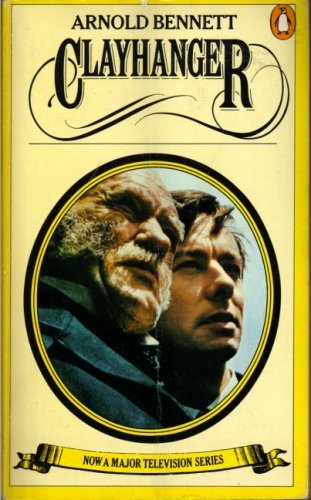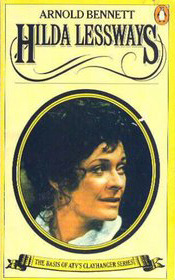


Books in series

#1
A Man from the North
1898
Famous British writer Arnold Bennett's novel 'A Man from the North' was first published in the year 1911. "There grows in the North Country a certain kind of youth of whom it may be said that he is born to be a Londoner. The metropolis, and everything that appertains to it, that comes down from it, that goes up into it, has for him an imperious fascination. Long before schooldays are over he learns to take a doleful pleasure in watching the exit of the London train from the railway station." -an excerpt

#2
Anna of the Five Towns
1902
Anna, a woman of reserve and integrity, lives with her tyrannical and selfish father. Courted for her money by the handsome and successful Henry Mynors, Anna defies her father's wrath—with tragic results. Set in the Potteries against a background of dour Wesleyan Methodism, Anna of the Five Towns is a brilliantly perceptive novel of provincial life in Victorian England. Newly designed and typeset in a modern 6-by-9-inch format by Waking Lion Press.

#3
Tales of the Five Towns
1905
...towards Moorthorne, and she had deliciously agreed, he was conscious of a tumultuous uplifting and splendid carelessness of spirits. 'Imagine me bringing it to a climax to-day,' he reflected, profoundly pleased with himself. 'Ah well, it will be settled once for all!' He admired his own decision; he was quite struck by it. 'I shall call her May before I leave her,' he thought, gazing at her, and discovering how well the name suited her, with its significances of alertness, geniality, and half-mocking coyness. 'So school is closed,' he said, and added '"Broken up" is the technical term, I believe.' 'Yes,' she answered, 'and I had walked out into the park to meditate seriously upon the question of my holiday.' She caught his eye in a net of bright glances, and romance was in the air. They had crossed a couple of smoke-soiled fields, and struck into the old Hanbridge road just below the abandoned toll-house with its broad eaves. 'And whither do your meditations point?' he demanded playfully. 159 'My meditations point to Switzerland,' she said. 'I have friends in Lausanne.' The reference to foreign climes impressed him. 'Would that I could go to Switzerland too!' he exclaimed; and 'Now for it! I'm about to begin.' 'Why?' she questioned, with elaborate simplicity. At the moment, as they were passing the toll-house, the other girl appeared surprisingly from round the corner of the toll-house, where the lane from Toft End joins the highroad. This second creature was smaller than Miss Lawton, less assertive, less intelligent, perhaps, but much more beautiful. Everyone halted and everyone blushed. 'May!' the interrupter at length stammered. 'May!' responded Miss Lawton lamely. The other girl was named May too

#4
The Grim Smile of the Five Towns
1907
The book has no illustrations or index. Purchasers are entitled to a free trial membership in the General Books Club where they can select from more than a million books without charge.
Subjects: Drama / English, Irish, Scottish, Welsh; Fiction / Classics; Fiction / Literary; Social Science / Social Classes;

#5
The Old Wives' Tale
1908
H.G. Wells described The Old Wives' Tale as "by far the finest long novel written in English and in the English fashion". He was, of course, speaking for his own generation, and a hundred years later the opinion may seem somewhat exaggerated. However, there is no doubt that The Old Wives' Tale is a superb novel of its kind, and it is still as readable and enjoyable as ever. First published in 1908, it tells the story of the Baines sisters—shy, retiring Constance and defiant, romantic Sophia—over the course of nearly half a century. Bennett traces the lives of the sisters from childhood in their father's drapery shop in provincial Bursley, England, during the mid-Victorian era, through their married lives, to the modern industrial age, when they are reunited as old women. The setting moves from the Five Towns of the Staffordshire Potteries to exotic and cosmopolitan Paris. It was fascinating to learn from Bennett's journal how he saw an old lady in a cafe and was inspired to think of how her life might have been lived, how she must have once been young. The plot of the novel came to him fairly promptly, and, as they say, the rest is history. This novel was serialized on British television with great success circa 2000.

#6
Clayhanger
1910
A novel about a boy growing to manhood in the last quarter of the 19th century. The first in a trilogy, it includes a portrait of an autocratic father.

#7
The Card
1911
Enoch Arnold Bennett was a British novelist.His most famous works are the Clayhanger trilogy, The Card and The Old Wives' Tale. These books draw on his experience of life in the Potteries, as did most of his best work. The Card is a short comedic novel written by Arnold Bennett in 1911. It was later made into a 1952 movie starring Alec Guinness and Petula Clark. It chronicles the rise of Edward Henry ("Denry") Machin from washerwoman's son to Mayor of Bursley (a fictitious town based on Burslem).

#8
Hilda Lessways
1911
This work has been selected by scholars as being culturally important, and is part of the knowledge base of civilization as we know it. This work was reproduced from the original artifact, and remains as true to the original work as possible. Therefore, you will see the original copyright references, library stamps (as most of these works have been housed in our most important libraries around the world), and other notations in the work. This work is in the public domain in the United States of America, and possibly other nations. Within the United States, you may freely copy and distribute this work, as no entity (individual or corporate) has a copyright on the body of the work.As a reproduction of a historical artifact, this work may contain missing or blurred pages, poor pictures, errant marks, etc. Scholars believe, and we concur, that this work is important enough to be preserved, reproduced, and made generally available to the public. We appreciate your support of the preservation process, and thank you for being an important part of keeping this knowledge alive and relevant.

#9
The Matador of the Five Towns
1912
'The Matador of the Five Towns' is a collection of stories, both tragic and comic, set in and around fictional versions of five of the towns that make up 'the Potteries' (Stoke-on-Trent.)

#10
These Twain
1915
This historic book may have numerous typos, missing text or index. Purchasers can download a free scanned copy of the original book (without typos) from the publisher. 1915. Not illustrated. ... CHAPTER XIX DEATH AND BURIAL Albert Benbow was at the front-door. Edwin curbed the expression of his astonishment. "Hello, Albert!" "Oh! You aren't gone to bed?" "Not likely. Come in. What's up?" Albert, with the habit of one instructed never to tread actually on a doorstep lest it should be newly whitened, stepped straight on to the inner mat. He seemed excited, and Edwin feared that he had just learnt of Auntie Hamps' illness and had come in the middle of the night ostensibly to make enquiries, but really to make a grievance of the fact that the Benbows had been "kept in ignorance." He could already hear Albert "Why have you kept us in ignorance?" It was quite a Benbow phrase. Edwin shut the door and shut out the dark and windy glimpse of the outer world which had emphasised for a moment the tense seclusion of the house. "You've heard of course about the accident to Ingpen?" said Albert. His hands were deep in his overcoat pockets; the collar of the thin, rather shabby overcoat was turned up; an old cap adhered to the back of his head. While talking he slowly lifted his feet one after the other, as though desiring to get warmth by stamping but afraid to stamp in the night. "No, I haven't," said Edwin, with false calmness. "What accident?" The perspective of events seemed to change; Auntie Hamps' illness to recede, and a definite and familiar apprehension to be supplanted by a fear more formidable because it was a fear of the unknown. "It was all in the late special Signal!" Benbow protested, as if his pride had been affronted. "Well, I haven't seen the Signal. What is it?" And Edwin "Is somebody else dying too?" "Fly-wheel broke. Ingpen was inspecting the sliphouse next to the engine-house. Part of the fly-wheel came through and knocked a...

#11
Roll Call
1918
The Roll-Call: Large Print by Arnold Bennett Follows the career of George Cannon, Hilda Lessway's son, as he mounted through succeeding strata of literary, artistic, political, and fashionable society. It ends with his enlistment and training for active service. We are delighted to publish this classic book as part of our extensive Classic Library collection. Many of the books in our collection have been out of print for decades, and therefore have not been accessible to the general public. The aim of our publishing program is to facilitate rapid access to this vast reservoir of literature, and our view is that this is a significant literary work, which deserves to be brought back into print after many decades. The contents of the vast majority of titles in the Classic Library have been scanned from the original works. To ensure a high quality product, each title has been meticulously hand curated by our staff. Our philosophy has been guided by a desire to provide the reader with a book that is as close as possible to ownership of the original work. We hope that you will enjoy this wonderful classic work, and that for you it becomes an enriching experience.